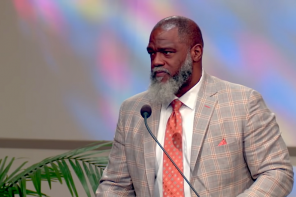An atheist and an evangelical walk into a bar… While probably the opening line of at least one joke, it’s also a recurring image in the new documentary called Collision, which follows atheist pugilist Christopher Hitchens and conservative evangelical pastor Douglas Wilson through a series of debates. The film opens with a scene from one of those debates—in a bar, both men perched comfortably on bar stools, two beer taps jutting up between them. But it seems to me that the the film is misnamed. The thing about collisions is this: when objects collide, they change one another in some non-trivial way. Sometimes it’s a crash, inflicting real damage. Sometimes it’s just a change in trajectory, as in the collision of billiard balls.
But neither Hitchens nor Wilson seems to have been damaged by their meeting, which led to the documentary (however misnamed) and a good deal of public exposure for both. And if the film’s substance is any indication, the exposure was largely positive—especially for Wilson who, prior to these debates, was probably best known for his controversial co-authorship of Southern Slavery: As It Was, which the Southern Poverty Law Center described as a “repulsive apologia for slavery.” Apparently, Wilson’s opposition to homosexuality is so strident that he is prepared to rehabilitate the Bible’s endorsement of slavery just so he can preserve its condemnation of homosexuality.
None of this controversy appears in the film. Perhaps Hitchens didn’t know about it; as he admits on camera, he doesn’t like to research his opponents too much. In any event, the film presents us with two men who appear affable and earnest—the sort with whom one might enjoy having a beer if one likes energetic intellectual discussions. In fact, the relationship between the men is so congenial that I found myself almost wishing Hitchens would follow the unfair route of blaming Christianity for Wilson’s more appalling views. Perhaps, then, there might have been a real head-on crash.
So what about a change of trajectory? Was either man inspired to rethink his conviction in light of their debates? If you take a look at the exchanges that took place in the pages of Christianity Today that bookend the live debates chronicled in the film, the answer would seem to be no.
In those print debates Hitchens claims that Christianity, in addition to having no evidence in its favor, represents the world in ethically unacceptable terms—among other things, as “a celestial North Korea in which liberty was not just impossible but inconceivable.” Wilson ripostes by claiming that Hitchens’ atheist worldview offers no basis for justifying ethical judgments (such as those Hitchens levels against Christianity) or for motivating anyone to care about morality.
At the conclusion of their public debates, Hitchens and Wilson published a much briefer exchange in the Huffington Post. And what do they say at the conclusion of years of interaction and, well, collision? Among other things, Hitchens represents Christianity as offering us a wholly unjustified picture of the world, one in which we live under the claustrophobic thumb of “a never-dying tyrannical father figure.” Wilson retorts by claiming that if one takes atheism seriously, one is forced to conclude that nothing has value or meaning, and that ethical judgments (such as those Hitchens wants to make) cannot have any objective validity.
So what happened in the interim to motivate this total absence of change? The film chronicles a series of intellectual sparring matches in which, among other things, Hitchens accuses Christianity of endorsing or motivating moral horrors, and Wilson responds by claiming that Hitchens cannot meaningfully call anything a moral horror without first believing in God. What, exactly, is going on?
A Sales Script for Young Evangelicals
I think the answer may actually be hinted at in an interview with Wilson conducted after a pre-screening of Collision. His interviewer was the like-minded evangelical writer and preacher John Piper (who made news recently by claiming that a Minneapolis tornado was God’s way of warning the Lutheran Church [ELCA] not to vote in favor of ordaining partnered gays and lesbians). The audience, also comprised of conservative evangelicals, ensured that the interview was predictably soft-serve, and his message is illuminating.
First of all, he told Piper that he engages in apologetic debating for the sake of the faithful. They are his audience. The purpose of his polemics is to help shore up the belief of those whose faith has been made “kind of wobbly” by exposure to atheist arguments. At one point Wilson expresses the hope that “Christians in secular universities who don’t know how to answer their professors would be equipped in how to do that, at least in their heads.”
The last clause here—“at least in their heads”—is particularly illuminating. Wilson clearly hopes that conservative Christian college students (and others), when confronted with intellectual challenges to their faith, will not treat these challenges as invitations to critically reflect for themselves on the merits of their beliefs. Instead, they ought to replay Wilson’s polemics in their heads.
At another point in the interview, Piper asks Wilson about “copiousness,” which turns out to be something Wilson thinks should be cultivated by all Christians who engage in polemical debates with atheists. And what is copiousness? It’s a “storehouse” of prepared answers to various challenges to the faith, such that “when he says something, there’s something right there… from the Scriptures, from Chesterton or Oscar Wilde.”
Put another way, Wilson advocates going into debates armed with a range of rehearsed responses and rejoinders—a flexible script, if you will. I am reminded of the scripts that novice salespeople are given, scripts which including the array of “rebuttals” they’re supposed to use in response to the various reasons customers might offer for not buying a product. For the salesperson armed with this flexible script, the human vulnerability of the single mother (one who expresses concern both for her children’s safety and for her precarious financial situation, for example) becomes a trigger for a set of prepared arguments that will ultimately result in a payment plan for a state-of-the-art, overpriced set of fire detectors.
One of the consequences of such scripts is that you don’t need to engage in an authentically personal way with the other individual and what she is saying. You just have to learn which objections or attacks to pluck from your toolkit in response to various challenges.
When it comes to selling a product, the purpose of such a script is clear: to keep the salesperson focused on making the sale, regardless of what the potential customer might say. But what is the purpose of using such a script in a debate? It certainly isn’t for the debaters to learn from one another, to be challenged by new ideas so that they might rethink and refine their own convictions. In a very real sense, it’s about preventing such transformations. When debaters rely on a flexible script, a challenge never triggers the question, “Could my opponent be right about this?” Instead, it sends them digging in their toolkit for the right retort. And when debaters lose, they are inspired to refine or expand their scripts, rather than the difficult work of revising the beliefs the scripts are intended to defend.
Clearly, Wilson hopes that his debates with Hitchens will provide the faithful with scripted answers for their own toolkits. But is he relying on a script himself? What about Hitchens? In a way, perhaps, but not in the way that novice salespeople regurgitate rebuttals written for them by someone else. Hitchens and Wilson are more like the seasoned salespeople who no longer need such explicit scripts. Instead, their toolkits contain an array of ideas, strategies of argument, and honed debating skills.
But this changes little. Whether their toolkits contain crude instruments or state-of-the-art power tools, the objective remains the same: to secure victory for their own view.
Preaching to Their Respective Choirs
Victory means you don’t need to modify your position—and the nice thing about the sort of contest Hitchens and Wilson pursue is that so long as both parties are well-matched, and so long as they both manage to get in a few good arguments, a few moments of mesmerizing rhetoric, or a few clever put-downs that get the fans cheering, both sides can declare victory. There is no official scoreboard, and each can return to his respective constituencies at the end of the day and spin the contest as a win.
Wilson can go back to his evangelical fan base and say, as he did in the Piper interview, “Hitchens has no argument… he just doesn’t like God.” He can point to the vagueness with which Hitchens responded when asked to provide, on his naturalistic assumptions, an objective foundation for the good and the beautiful.
Hitchens can go back to his fan base and point out that Wilson never really answered the moral objections to his conservative theology, that he evaded these objections by making the unreasonable demand that Hitchens work out, on the spot, a fully adequate naturalistic theory of morality and aesthetics.
And so everyone on both sides can go on believing that they have the high ground and that the people on the other side are either irrational, immoral, or both—an outcome that works well for people such as Hitchens and Wilson, those who profit from polarization.
Of course, it only works if your opponent agrees to play by the rules. This helps to explain why Hitchens expresses such appreciation for Wilson’s willingness to stick trenchantly to his conservative theology. “I know where I am with him,” Hitchens declares.
Put another way, he knows where the goal posts are. He knows what will count as a score against his opponent. And as I reflect on the character of the confrontation between Hitchens and Wilson and their mutual appreciation for one another, I come to better understand one of the most common criticisms of my own book, Is God a Delusion?
The criticism is this: while my book is supposed to be a response to the recent wave of so-called “new atheist” bestsellers (including Hitchens’ God is Not Great), what I really end up doing is agreeing with most of their criticisms but then reinterpreting religion to avoid them.
While a bit exaggerated, there’s actually some truth to this charge. When Dawkins rails against the newest permutation of creation science, “Intelligent Design theory,” my response is, “Yes, and it’s not just bad science but bad theology, too.” When Sam Harris bemoans the doctrine of biblical inerrancy, I respond with, “Yes, it’s a terrible theory about the nature of divine revelation and an extremely dangerous one that strips any meaningfulness from the claim that God is good.” When Hitchens points to the violence done in religion’s name, I respond with “Right. When religion becomes the basis for creating in-group/out-group ideologies, it has been appropriated by one of the greatest evils that there is.” When the new atheists point out the arrogance of religious claims to certainty about the fundamental nature of reality, I agree and note that such professions of certainty really amount to a kind of idolatry.
In short, I agree that much that goes by the name of religion falls outside the parameters demanded by both intellectual respectability and moral decency. And I think atheist critics of religion can actually help us to identify those parameters and see where they have been overstepped. Where I disagree is in the new atheist insistence that religion cannot fall within these parameters. I think it can, but I think the effort to bring any human enterprise fully within such parameters is always ongoing, always a struggle, because human beings are finite and fallible creatures.
In response to these ideas, I have been accused of “moving the goal posts”—more often than not in precisely those terms. The idea is that instead of trying to defend the goal that the new atheists are trying to score against, I’m standing on the sidelines defending the water cooler and shouting “missed again!” every time a new atheist kicks one straight into the net.
But I think this analogy tells us more about the current state of the so-called “God debates” than it does about anything else. It seems to me that far too many people treat these debates as a zero-sum competition. Hitchens and Wilson are eager to play that game—and, like sports rivals, they can enjoy authentic camaraderie off the playing field.
Winning the Argument, Losing the Truth
But that simply isn’t the game I want to play. It isn’t the game that most religious progressives want to play. Nor do I think society benefits when exchanges between theists and atheists are conceived in terms of the analogy of a sporting match. So let’s change the analogy. Suppose I were a scientist developing an astronomical theory. Suppose a rival scientist with a different theory points out a problem with my theory—some observation it can’t account for. I think about his concern and realize he’s right. And so I sit down and revise my theory to account for the problem. Would it be coherent for my critic to accuse me of moving the goal posts? “He modified the theory to account for my criticism! I had his theory nailed, and he goes and fixes it! No fair!”
Of course such a response would be absurd. Because good science involves listening to criticisms of one’s theories, assessing their merits, and then, if they do have merit, modifying one’s theories accordingly. Good science isn’t about trenchantly defending an unalterable theory. In good science, ideas evolve in the light of critical discourse. There are changes in trajectory when theories collide, because good science is not about winning in the eyes of your constituency. It’s about seeking the truth.
It seems to me that it should be the same way with disagreements about what it’s legitimate to believe concerning the fundamental nature of reality. When we ask whether the scope of science and empirical investigation delineates the limits of what we may legitimately believe, Hitchens and Wilson come to the table with rival perspectives. And they have important and interesting things to say about their respective theories. They also have important concerns to raise against one another’s views.
But there’s also something else they bring to the table: a commitment to winning the debate. And so when one of them shares his ideas and arguments in support of his position, the question the other is asking isn’t “Is there a truth in this that I need to affirm and appropriate in order for my own viewpoint to be enriched?” Instead, it is more likely to be this: “What point can I safely concede, so as to look open minded, without risking losing the argument?” The question isn’t, “Where do I honestly disagree with this?” Rather, it’s more likely to be this: “Where is this most vulnerable to attack?”
If they learn anything from their encounter with one another, it’s about improving their game. When they walk off the debating floor, what they are thinking about is how to more effectively respond in the future to the kinds of attacks they encountered. What they are not thinking about is whether their opponent has a point. If they start thinking about that, they’re in danger of revising their respective views.
I am not saying that debates that take this adversarial form are wholly without value. But their fruits are not going to be reaped by those who are caught up in the zero-sum struggle that is being played out before them. Our court system recognizes this, and so introduces impartial judges and juries whose job it is to provide the synthesis that the contestants in the adversarial competition cannot provide.
But the sad truth is that when people like Hitchens and Wilson spar, it’s easy to get caught up in the game-day fever. It’s easy because they make it easy—in part by adopting polarized and antagonistic versions of their respective positions. In fact, one gets the sense that they chose each other as debating partners precisely because they knew that their respective target audiences would be appalled by much of what the other guy stands for, and so would be inspired to root for their own guy to win. Hitchens and Wilson make it easy because an audience of partisans is precisely what they want.
And the open-minded quest for truth, of which Hitchens speaks so eloquently, is lost in the fray.




